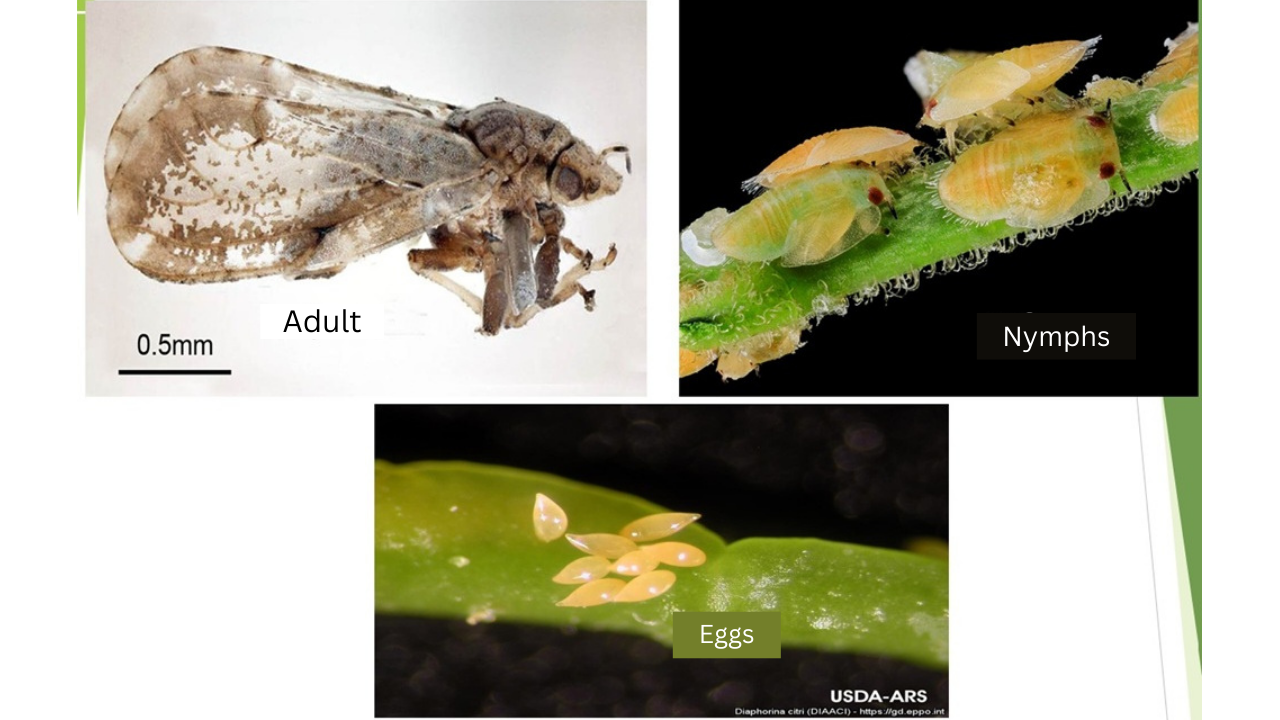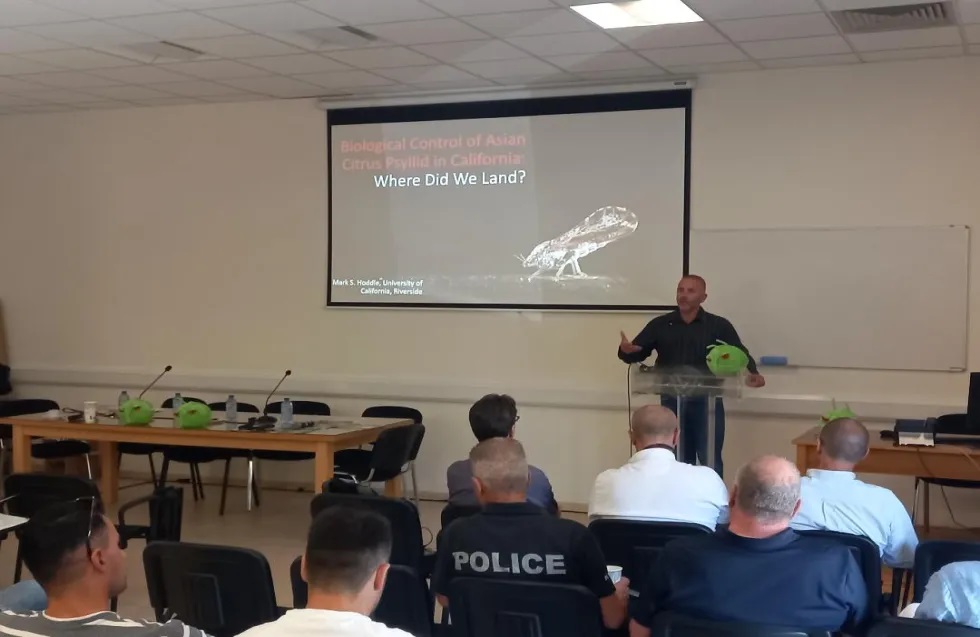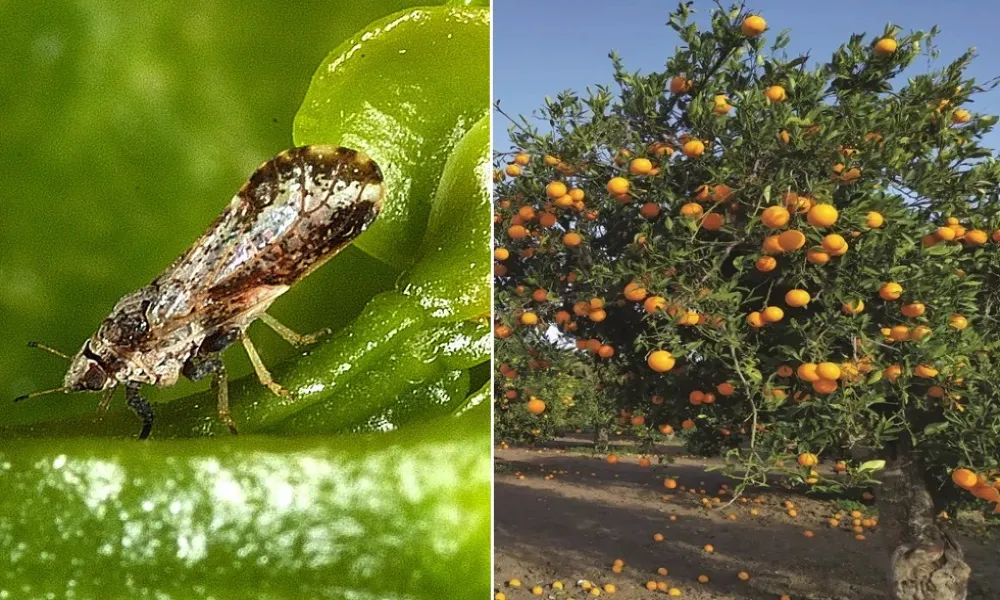Cyprus is stepping up the fight against the deadly citrus disease huanglongbing (HLB), known as the ‘yellow dragon,’ three months after welcoming experts from the United States and Spain. The international team is helping the Republic implement stronger measures to prevent and contain what is considered the world’s most destructive threat to citrus crops.
The bacterium now poses a real threat to citrus plantations in Cyprus, after the Asian citrus psyllid (Diaphorina citri), the primary carrier of the disease, was first detected in Fasouri, Limassol in 2023. Since then, the insect has spread across the island. Notably, Cyprus is currently the only European Union member state where this insect has been identified, prompting close monitoring by the relevant European Commission authorities. According to the Department of Agriculture, the nearest country with reported HLB cases is Saudi Arabia.
“The Department of Agriculture, in collaboration with the Agricultural Research Institute, has taken immediate measures, developing a National Action Plan against the harmful insect. This plan aims, under Article 17 of EU Regulation 2016/2031, to contain or eradicate the pest to prevent or minimize any potential spread of the bacterium if it enters Cyprus,” said Anthemis Melifronidou-Pantelidou, Head of the Plant Health Division at the Department of Agriculture, in an interview with Politis.

She added that the authorities are conducting systematic, intensive inspections across Cyprus to confirm the absence of the HLB-causing bacterium. “For this purpose, the Department hosted American and Spanish experts this year and conducted online sessions with Israel’s relevant authority. The visits included workshops and targeted meetings to exchange experiences and provide a comprehensive update to stakeholders in Cyprus,” she explained.
In the US, where both the Diaphorina citri insect and the bacterium are present, models demonstrating effective management strategies are invaluable for Cyprus. In Israel, a nearby country where only the insect has been detected so far, discussions focus on measures that can be taken in residential areas, urban greenery, and citrus plantations, providing crucial data for evaluation. Cooperation with experts from Spain’s IVIA research center has also been highly beneficial and will continue with regular visits planned for 2025 and 2026.
Sample Collection
How is continuous and effective sampling achieved? Are there sufficient human resources from the Department of Agriculture, university students, or volunteers? Have local authorities been involved?
“For 2025, specific digital tools from the European Food Safety Authority (EFSA) are being utilized to calculate the required number of samples. The number of samples has increased to ensure a high confidence level for detecting the bacterium and a very low prevalence rate. Nationwide, samples will be collected by trained Department of Agriculture personnel. Most samples will come from citrus plantations, but trees in municipalities and communities are also included,” said Marios Georgiadis, Agriculture Officer in the Plant Health Division.

Local Authorities
Regarding the role of local authorities, Georgiadis noted that they have been informed and asked to cooperate in planning inspections and sampling in urban green spaces. “Due to the unusually high temperatures in recent months, the D. citri population has significantly declined, making detection difficult. We expect that changes in temperature will allow an accurate assessment of the insect’s population and its spread in urban areas,” he said.
Cooperation with the Occupied Areas
Collaboration with the occupied territories is also essential, as insects and bacteria do not recognize borders. The Department of Agriculture began cooperating with the Bi-communal Technical Committee on the Environment in 2024, exchanging information from inspections carried out by EU plant health inspectors. Sampling of adult D. citri from these areas continues, with specimens sent to the Department’s plant protection laboratory to confirm the absence of the HLB-causing bacterium. Further meetings are expected before the end of the year.
Discovery of a Natural Predator
Recent studies identified a new biological agent in Cyprus: the insect Tamarixia citricola, recently confirmed as a natural predator of the Asian citrus psyllid. The Department of Agriculture, in collaboration with the Agricultural Research Institute, the Eratosthenes Center at TEPAK, and international research centers, is currently evaluating its potential to control D. citri.

The Silent Killer
The HLB bacterium acts as a silent killer, blocking the flow of nutrients in citrus trees. Leaves develop yellow patterns, fruits become bitter and deformed, and trees die within five to eight years. Despite over $2 billion spent on research worldwide, no cure exists. The consequences are stark: Florida, once a global citrus powerhouse, lost 90% of its production, while Brazil, the world’s largest producer, lost half of its trees.
Dr. Melifronidou-Pantelidou warned that if the bacterium were detected in Cyprus, the presence of its insect vector would enable rapid spread, causing extensive damage to agriculture, urban greenery, the environment, and the economy. “The bacterium would not only degrade fruit quality and kill trees but also affect the entire agri-food chain, including supermarkets, exporters, and food producers who rely on citrus fruits. Many small businesses depend on citrus cultivation for traditional products such as jams, lemonades, juices, liqueurs, sweets, and more,” she said.
Exports and Production Value
According to the Agricultural Payments Organization (2023), Cyprus controls approximately 3,000 hectares of citrus cultivation, excluding gardens and public spaces. The Statistical Service reported that in the same year, citrus exports were valued at €12.408 million (18,828 kg). For January-August 2024, the value was €7.289 million (10,860 kg).
Regarding production value, data up to 2021 indicate that on 2,908 hectares with a total yield of 56,199 tons, the total production value was €14.32 million.
